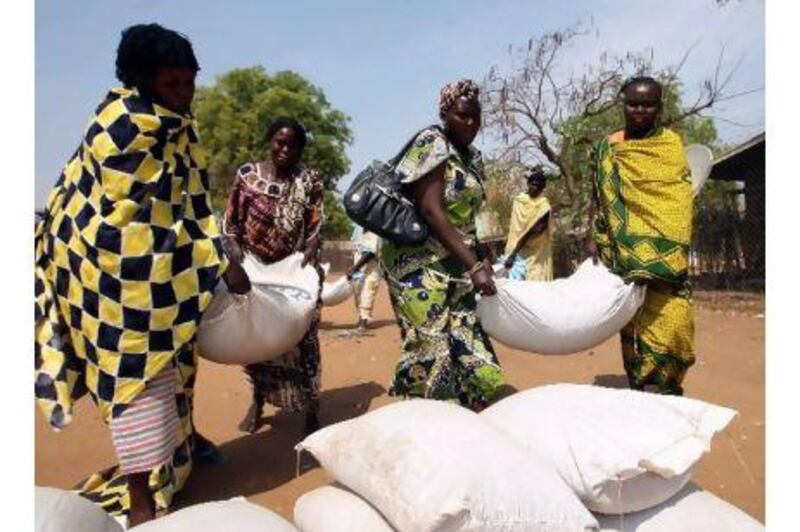KHARTOUM // With the week-long voting for an independent south Sudan drawing to a close, a prominent Sudanese opposition leader said yesterday that the country was headed towards "chaos" and "economic and political disintegration."
Hassan al Turabi, the one-time power behind attempts to bring an Islamic regime to Sudan and now an opposition leader, said northerners were "angry" and likely to become restive as southerners emerge from the voting this week and will likely begin establishing their own independent state.
"People are shocked. I've never seen them so shocked than they are today. There is anxiety," he said. "I don't think people will leave the country. They will stay and they can rise."
Mr al Turabi helped bring President Omar al Bashir to power in 1989, then worked to implement Islamic law. But he fell out with Mr al Bashir in 1999 and for the past 10 years, authorities have frequently jailed or detained him without a clear charge. He has often criticised what he calls the government's repressive tactics.
Yesterday, he said the division between north and south was unfortunate but inevitable, given Khartoum's long-time marginalisation of the south and the fact that the south "would not listen" following a peace accord in 2005.
"It's like having something being torn away from your own body. It's very sad," Mr al Turabi said after watching busloads of southerners loaded in trucks and lorries heading south.
"They [the government] should have realised this country had to be integrated at a social level. You have to have a foundation, then you can build on it. Otherwise, each wall will collapse. Now this country will never be connected," he said.
Like Mr al Turabi, Idris al Banna, a former top Sudanese official who is preparing to launch an international campaign to promote northern Sudanese culture, forecast difficult days ahead for Sudan. "Unless democracy comes back to this country, chaos is definitely expected," he said.
Mr al Turabi said the drive for self-determination in Sudan might not end in the south.
"The word 'independence' is being heard" in Darfur, he said, "and I heard people in the east are saying 'self-determination'."
The economy of the region is likely to be hit hard later in the year as the effects of the south's secession take hold, Mr al Turabi predicted.
"It will be a miserable time. The north can stand alone but needs the south. And it's very difficult for the south to stand alone because it is undeveloped," he said.
While Mr al Turabi retains widespread support in Sudan, he has critics besides those in Mr al Bashir's government.
Khalid Mansour, a marketing specialist in Khartoum, believes the country lacks a unifying leader. Mr al Turabi, he said, does not fit the bill.
"There is a whole generation who does not know what Turabi represents. There is a whole generation that is disconnected from the political scene because they have other concerns like employment, family and education," Mr Mansour said.
Mr al Turabi was secretary general of the Islamic Charter Front, the political arm of Sudan's Muslim Brotherhood, from 1964-1969. He later reorganised it into the National Islamic Front. In 1979, he was appointed Sudan's attorney general, after earning law degrees from Khartoum University, the University of London and the Sorbonne.
If he is shunned by some Sudanese, it is because his record and image have been distorted, he said.
"The Turabi you have in your mind is a media image - 'The Pope Noir', 'The Black Pope of terrorism.' But he's just a myth. The media throw around such labels that circulate like the dollar."





